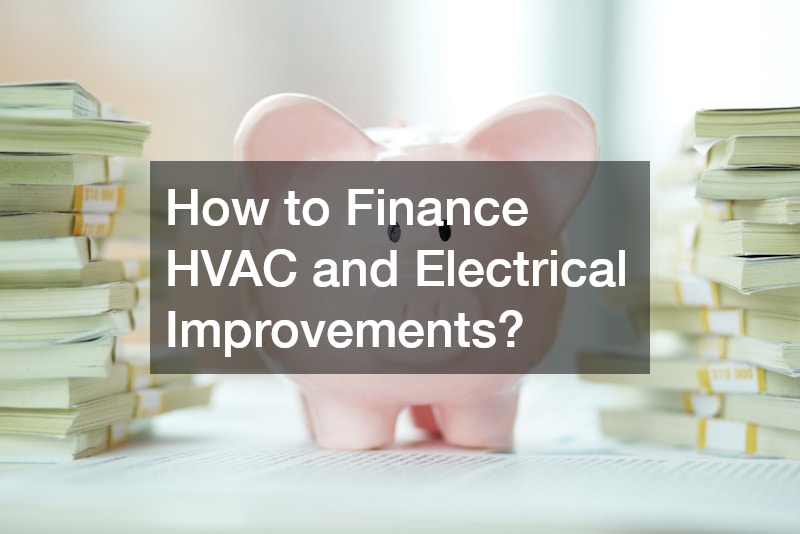Save Money with HVAC and Electrical Improvements
This article explores how making specific HVAC and electrical improvements can help you save money. With the rising cost of energy, understanding how to optimize your home’s systems is crucial. We will delve into practical steps and considerations to ensure efficient energy use and reduced costs. Topics include solar energy, heating and cooling strategies, and essential home upgrades like water heater installation, leak detection, and roofing services.
How Can Upgrading Your HVAC System Save You Money?

Understanding Energy Efficiency Ratings
Energy efficiency ratings are essential indicators of how effectively an HVAC system uses electricity. Seasonal Energy Efficiency Ratio (SEER) and Heating Seasonal Performance Factor (HSPF) are two commonly used ratings. Systems with higher SEER or HSPF ratings consume less energy, translating to lower utility bills. Choosing Energy Star-certified HVAC systems ensures compliance with modern efficiency standards.
Benefits of Smart Thermostats
Smart thermostats optimize heating and cooling schedules based on occupancy and usage patterns. They learn your habits and adjust temperatures accordingly, preventing energy waste. Features like remote control via smartphone apps and integration with other smart devices enhance efficiency further. Over time, these devices can significantly cut heating and cooling expenses.
Impact of Regular Maintenance
Neglecting HVAC maintenance can lead to decreased efficiency and unexpected breakdowns. Tasks such as changing air filters, cleaning coils, and checking refrigerant levels ensure the system operates optimally. Scheduled maintenance prevents minor issues from escalating into costly repairs, thereby extending the system’s lifespan and maintaining energy efficiency.
Importance of Proper Insulation
Insulation plays a critical role in HVAC performance. Proper insulation in walls, attics, and floors prevents heat loss in winter and keeps interiors cool during summer. This reduces the workload on HVAC systems, leading to reduced energy consumption and lower utility bills.
Selecting the Right HVAC Size
A system that is too large or too small for your space can lead to inefficiencies and increased energy use. Oversized systems tend to short cycle, while undersized ones overwork. A professional HVAC assessment ensures the correct sizing, enhancing comfort and saving money in the long run.
Considering Ductless Mini Split Systems
A ductless mini split system offers zoned temperature control, allowing you to heat or cool specific rooms without wasting energy on unoccupied spaces. These systems are ideal for homes without existing ductwork and can lead to substantial savings on heating and cooling costs.
What Are Effective Electrical Improvements for Saving Money?
Transitioning to LED Lighting
LED bulbs consume significantly less energy than traditional incandescent or CFL bulbs. They also last longer, reducing replacement costs. Upgrading to LED lighting throughout the home is one of the quickest and most cost-effective ways to lower electricity consumption.
Appliance Upgrades for Efficiency
Older appliances often consume more power than modern energy-efficient models. Upgrading to Energy Star-rated appliances, including refrigerators, dishwashers, and washing machines, can drastically cut energy costs. These appliances are designed to perform optimally while using minimal electricity.
Benefits of Installing Energy Meters
Energy meters provide real-time insights into electricity usage, helping homeowners identify high-consumption devices. By monitoring and adjusting usage, it becomes easier to manage costs and make informed decisions about future upgrades.
Implementing Energy-Efficient Wiring
Outdated or inefficient wiring can result in energy loss and safety hazards. Rewiring with modern, energy-efficient materials ensures safer and more efficient power distribution. This is especially important in older homes where wiring may not meet current energy codes.
Using Solar-Powered Solutions
Incorporating solar-powered devices such as garden lights, water heaters, or even whole-home solar systems can substantially reduce reliance on the grid. These systems, while requiring upfront investment, offer long-term savings and can even produce surplus power for resale in some areas.
What is the Role of a Home Energy Audit in Reducing Costs?

Identifying Energy Loss Areas
A home energy audit pinpoints areas where energy is being wasted. Common culprits include drafty windows, poor insulation, outdated appliances, and roofing issues. Leak detection is another critical aspect, as undetected water or air leaks can significantly increase energy bills.
Prioritizing Energy-Efficient Updates
Following an audit, homeowners receive a prioritized list of updates based on potential energy savings. This strategic approach ensures that the most impactful changes are made first, maximizing return on investment.
Cost-Benefit Analysis of Improvements
Audits include cost-benefit analyses to help homeowners understand which upgrades will save the most money over time. This helps justify the initial expense of improvements by projecting future savings.
Understanding Audit Tools and Techniques
Home energy auditors use tools like infrared cameras, blower doors, and moisture meters to detect inefficiencies. Understanding these tools helps homeowners appreciate the thoroughness and value of a professional audit.
Professional vs. DIY Audits
While DIY audits can highlight obvious issues, professional audits offer in-depth insights backed by specialized tools and expertise. Though they may come at a cost, professional audits often pay for themselves through the savings they uncover.
How Do Smart Devices Contribute to Energy Savings?
Features of Smart Thermostats
Smart thermostats adjust temperatures based on real-time data and preferences. They can track energy usage, offer energy reports, and suggest ways to save. Their learning algorithms make them increasingly effective over time.
Smart Plugs and Outlets Management
Smart plugs allow remote control and automation of connected devices. They help manage usage and eliminate unnecessary standby power consumption. By scheduling or turning off devices remotely, they contribute to energy conservation.
Automated Lighting Systems
Lighting systems that respond to motion sensors or timers ensure lights are only on when needed. These systems reduce human error, like leaving lights on in empty rooms, thereby saving electricity.
Smart Home Integration
Integrating HVAC, lighting, and appliances into a single smart home system allows centralized control and optimization. This holistic approach ensures that all systems work together efficiently, minimizing energy waste.
Energy Monitoring through Apps
Many smart home devices come with apps that track and analyze energy usage. These apps provide actionable insights, trends, and tips for reducing consumption, helping homeowners stay on top of their energy use.
What Are the Economic Benefits of Solar Panels?

Initial Costs vs. Long-term Savings
Although solar panels require a significant initial investment, the long-term savings on energy bills often outweigh the costs. Over time, homeowners can recoup their investment through reduced or eliminated electricity bills. Solar energy also provides resilience against rising utility rates.
Government Incentives and Rebates
Many local and federal governments offer tax credits, rebates, and other incentives for installing solar panels. These programs can significantly reduce upfront costs and improve the financial viability of solar energy systems.
Increase in Property Value
Homes equipped with solar panels often sell at higher prices and attract more buyers. The prospect of lower energy bills adds tangible value, making solar installations a smart real estate investment.
Considerations for Installation
Factors like roof orientation, shading, and structural integrity affect the efficiency of solar panels. Professional roofing services should assess your roof’s condition to ensure it’s ready for solar installation.
Maintenance and Lifespan of Panels
Solar panels require minimal maintenance and can last 25 years or more. Periodic cleaning and inspections keep them operating efficiently, ensuring consistent energy savings throughout their lifespan.
Why Regular Maintenance of HVAC and Electrical Systems is Crucial?
Preventing Unexpected Costs
Routine maintenance helps identify and resolve small issues before they become major, expensive problems. This proactive approach saves money on emergency repairs and extends the lifespan of systems.
Ensuring System Longevity
Well-maintained systems tend to last longer, providing better value over time. Regular inspections, cleanings, and tune-ups ensure HVAC and electrical components remain in top condition.
Optimizing Efficiency
Maintenance tasks such as lubricating moving parts, checking connections, and replacing filters ensure systems run at peak efficiency. Efficient systems use less energy, reducing monthly bills.
Recommended Maintenance Practices
For HVAC systems, recommended practices include changing filters every one to three months and having annual professional inspections. For electrical systems, checking circuit breakers, outlets, and wiring periodically helps prevent issues. Regular water heater maintenance is also essential for ensuring consistent performance and energy savings.
Seasonal Maintenance Tips
Before summer and winter, HVAC systems should be checked to ensure they can handle extreme temperatures. Electrical systems should also be inspected for any seasonal demands, such as holiday lighting or increased appliance use. For homes using propane, working with a reliable local propane service for propane delivery ensures uninterrupted heating. Maintenance of devices like Heaters and tankless water heaters, such as the Rheem 18kW tankless water heater, is also key to maintaining system reliability.
How Does Insulation Affect HVAC Efficiency?
Types of Insulation Materials
Common insulation materials include fiberglass, cellulose, spray foam, and rigid foam. Each offers varying levels of thermal resistance (R-value), affecting their ability to prevent heat transfer.
Installation Process and Costs
Insulation installation costs depend on the material, area, and labor involved. While spray foam tends to be pricier, it offers superior air sealing. Choosing the right type balances cost and performance.
Thermal Performance Impact
High-quality insulation significantly improves a home’s thermal envelope, reducing the need for khttps://www.tlcmechanicalplumbingheatingcooling.com. This directly lowers HVAC system usage and associated energy costs.
Measuring Insulation Efficiency
Insulation efficiency is measured using R-values. Higher R-values indicate better insulating properties. Local climate determines the recommended R-value, ensuring optimal energy conservation.
Retrofitting vs. New Installation
Retrofitting insulation in existing homes can be challenging but cost-effective. In new constructions, planning for optimal insulation from the start ensures maximum efficiency from day one.
Are Energy-Efficient Windows a Worthwhile Investment?
Benefits of Double-Paned Windows
Double-paned windows provide a thermal barrier that reduces heat loss in winter and heat gain in summer. Some versions include gas fills or low-emissivity coatings to enhance performance.
Estimating Energy Savings
Energy-efficient windows can reduce heating and cooling costs by up to 30%. The exact savings depend on the home’s location, window orientation, and insulation quality.
Comparing Window Frame Materials
Frame materials such as vinyl, wood, and fiberglass vary in cost and insulating properties. Vinyl is low-cost and efficient, while wood offers aesthetic appeal and good insulation.
Installation Considerations
Proper installation is critical to window performance. Poorly installed windows can lead to air leaks and diminished energy savings. Hiring experienced professionals ensures a tight seal and optimal efficiency.
Long-term Performance Expectations
High-quality energy-efficient windows can last 20 years or more with proper maintenance. Their durability and performance consistency make them a sound long-term investment.
What Electrical Improvements Can Reduce Standby Power Consumption?
Understanding Phantom Loads
Phantom loads refer to electricity consumed by devices in standby mode. Examples include TVs, chargers, and microwaves. These loads can account for up to 10% of household energy use.
Using Timers and Power Strips
Timers and advanced power strips cut power to devices not in use. Some smart strips even detect when a device is idle and shut off power automatically, reducing unnecessary consumption.
Unplugging Unused Devices
Simply unplugging devices when not in use eliminates standby consumption. While easy to overlook, this habit can lead to noticeable energy savings over time.
Energy Star Appliances
Energy Star-rated appliances are designed to minimize standby energy use. Choosing these products ensures compliance with the latest energy-saving standards.
Smart Energy Technologies
Advanced technologies monitor and manage energy use in real time. These systems can automatically power down devices, track usage, and provide actionable data for further savings.
How to Finance HVAC and Electrical Improvements?

Exploring Government Grants
Governments often offer grants for energy-efficiency upgrades. These programs help offset costs for HVAC replacements, insulation, solar energy systems, and water heater installation.
Understanding Loan Options
Energy-efficient improvement loans, such as those from FHA or local utilities, offer favorable terms for homeowners making upgrades. These loans typically have lower interest rates and flexible repayment terms.
Benefits of Energy-Efficiency Rebates
Rebates from manufacturers or utilities incentivize the purchase of energy-efficient equipment. These rebates reduce upfront costs, making upgrades more accessible.
Cost-Saving Calculators
Online calculators help estimate savings from energy-efficient upgrades. By inputting details like home size and current system specs, homeowners can project potential reductions in energy bills.
Contractor Payment Plans
Many contractors offer financing plans for HVAC and electrical projects. Spreading the cost over time makes large upgrades more manageable and budget-friendly.
Enhancing your home’s HVAC and electrical systems can significantly reduce energy costs and improve overall efficiency. By considering the strategies outlined in this article—from solar energy adoption and smart device integration to leak detection and proper water heater installation—you can make informed decisions that not only lower expenses but also contribute to a more sustainable lifestyle.



